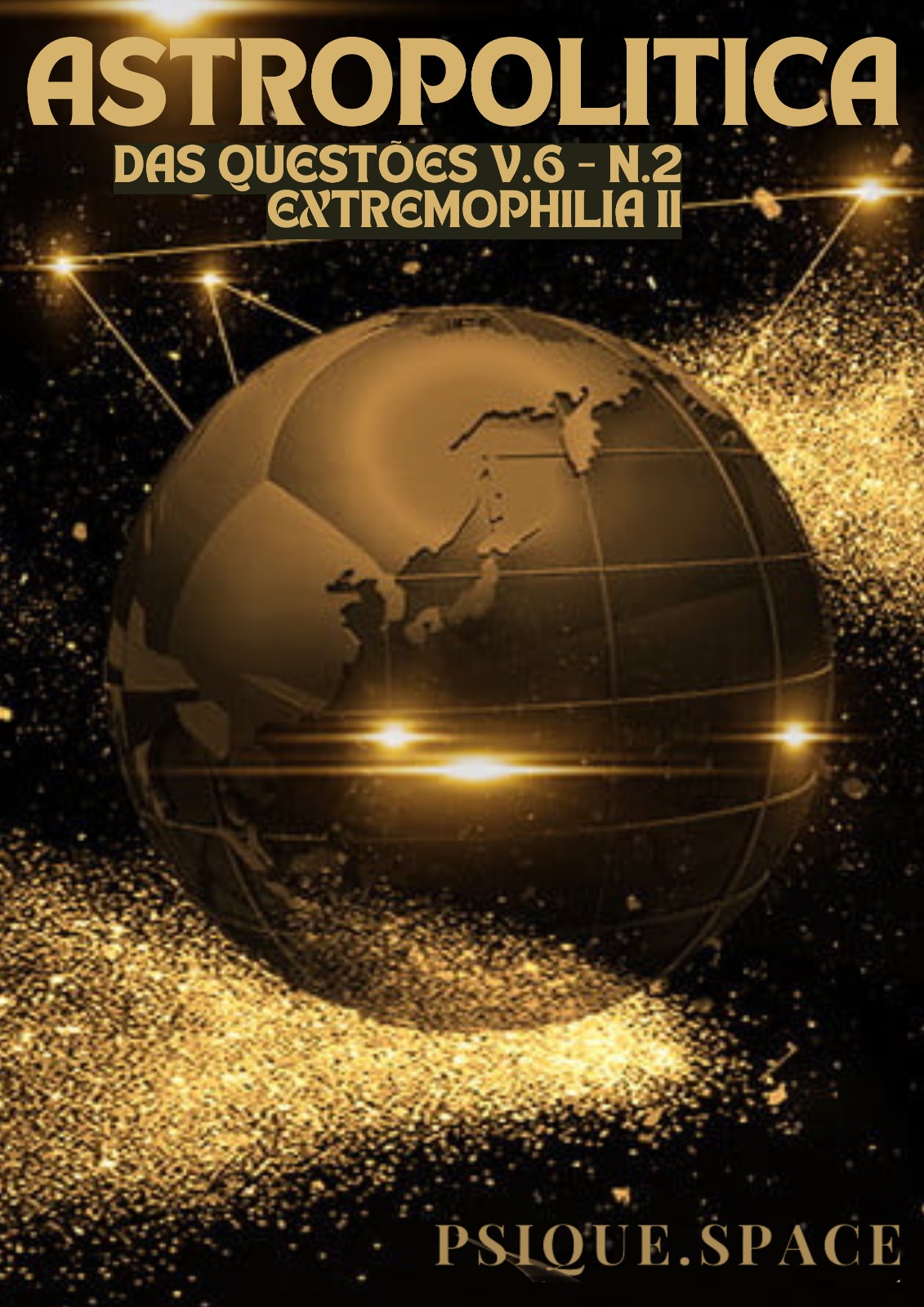PER ASPERA AD ASTRA: filosofía de la astrobiología, el problema de la extinción y los caminos éticos del futuro
Conteúdo do artigo principal
Resumo
Resumo. O objetivo deste artigo é refletir sobre uma disciplina pouco estudada na língua espanhola: a filosofia da astrobiologia. Institucionalizada como campo do conhecimento no século XX, os problemas colocados pela astrobiologia (busca da vida no cosmos, o lugar do sujeito no universo, reformulações radicais na formação do conhecimento científico, desenvolvimentos no campo tecnológico, o problema de extinção, entre tantos outros) são centrais para pensar como a humanidade é concebida no presente e, principalmente, no futuro. Daí decorre que esta disciplina investiga problemas de ordem ontológica, epistemológica, política, ética e, inclusive, religiosa. O artigo busca investigar alguns desses problemas para destacar a importância da astrobiologia na filosofia.
Downloads
Detalhes do artigo

Este trabalho está licenciado sob uma licença Creative Commons Attribution-NonCommercial 4.0 International License.
Autores que publicam nesta revista concordam com os seguintes termos:
Autores mantém os direitos autorais e concedem à revista o direito de primeira publicação, sendo o trabalho simultaneamente licenciado sob a Creative Commons Attribution License o que permite o compartilhamento do trabalho com reconhecimento da autoria do trabalho e publicação inicial nesta revista.
Autores têm autorização para assumir contratos adicionais separadamente, para distribuição não-exclusiva da versão do trabalho publicada nesta revista (ex.: publicar em repositório institucional ou como capítulo de livro), com reconhecimento de autoria e publicação inicial nesta revista.
Autores têm permissão e são estimulados a publicar e distribuir seu trabalho online (ex.: em repositórios institucionais ou na sua página pessoal) a qualquer ponto antes ou durante o processo editorial, já que isso pode gerar alterações produtivas, bem como aumentar o impacto e a citação do trabalho publicado.
Referências
ARETXAGA-BURGOS, Roberto. Hacia una filosofía de la astrobiología. Pensamiento, núm. 269, p. 1083-1118, 2015.
ARETXAGA, Roberto.; CHELA-FLORES, Julian. Biocentrismo y filosofía (II). Letras de Deusto, 36 (110), p. 30-35, 2008.
CERCEAU, Florence Raulin. Pioneering Concepts of Planetary Habitability. In: D.A. Vakoch (Ed.), Astrobiology, History, and Society. Life Beyond Earth and the Impact of Discovery. Berlin-Heidelberg: Springer-Verlag, 2013, p. 121-122.
CHON-TORRES, Octavio Alfonso. Astrobioethics. International Journal of Astrobiology, 17 (1), p. 51-56, 2017.
DICK, Steven. The Postbiological Universe. 57Th International Astronautical Congress, p. 1-10, 2006.
HEGEL, Georg Wilhelm Friedrich. Vorlesungen über die Philosophie der Natur 1819/1820. In: M. Bondeli; H.N. Seelmann (Hg.), Vorlesungen. Ausgewählte Nachschriften und Manuskripte, Band 16. Hamburg: Felix Meiner Verlag, 2002, p. 65-66
LUPISELLA, Mark.; LOGSDON, John. Do we need a Cosmocentric Ethic?. International Astronautical Congress, p. 1-10, 1997.
MARGULIS, Lynn. Planeta simbiótico. Un nuevo punto de vista sobre la evolución. Trad. Victoria Laporta Gonzalo. Barcelona: Editorial Debate, 2002, p. 45.
MARRINER, Nick.; MORHANGE, Christophe.; SKRIMSHIRE, Stefan. Geoscience meets the four hoursemen? Tracking the rise of neocatastrophism. Global and Planetary Change, 74, 2010 43-48.
MEILLASSOUX, Quentin. Después de la finitud. Ensayo sobre la necesidad de la contingencia. Trad. Margarita Martínez. Ciudad Autónoma de Buenos Aires: Caja Negra Editora, 2015, p. 87-88.
MORE, Max. The Extropian principles version 3.0. A transhumanist declaration. MROB. 4 de mayo del 2023, Recuperado de https://www.mrob.com/pub/religion/extro_prin.html
NAUDÉ, Wim. Extraterrestrial Artificial Intelligence: The Final Existential Risk?. IZA Institute of Labor Economics, p. 1-29, 2023.
NIINILUOTO, Ilkka. Truth-Seeking by Abduction. Cham: Springer Nature Switzerland AG, 2018, p. 152.
SAPIO, Lo Luca. The ethics of astrobiology: Humanity’s place in the cosmos and the extinction problem. Frontiers in Astronomy and Space Sciences, vol. 9, p. 1-5, 2022.
STENGER, Victor J. The Fallacy of Fine-Tuning. Why the Universe is not designed for us. New York: Prometheus Books, 2011, p. 36-38.
SULLIVAN, Woodruff T. III. Extraterrestrial Life as the Great Analogy, Two Centuries Ago and Modern Astrobiology. In: D.A. Vakoch (Ed.), Astrobiology, History, and Society. Life Beyond Earth and the Impact of Discovery. Berlin-Heidelberg: Springer-Verlag, 2013, p. 73-84.
ROBLES, Gustavo. La teoría del reconocimiento de Axel Honneth. In: A. Camou (Coord.), Cuestiones de teoría social contemporánea. EDULP, 2023, p. 881-905.
RODRÍGUEZ-MANFREDI, José Antonio. La innovación tecnológica en la astrobiología como motor de cambio en la mentalidad actual. Letras de Deusto, vol. 38 (118), p. 68-75, 2008.
ROMANOVSKAYA, Irina K. Planetary biotechnospheres, biotechnosignatures and the search for extraterrestrial intelligence. International Journey of Astrobiology, 22 (6), p. 663-695, 2023.
ROMERO, Gustavo E. La filosofía científica y los límites de la ciencia. Revista Científica de Estudios e Investigaciones, 6(1), p. 97-103, 2017.
ROSS, Joseph T. Hegel, Analogy and Extraterrestial Life. In: D.A. Vakoch (Ed.), Astrobiology, History, and Society. Life Beyond Earth and the Impact of Discovery. Berlin-Heidelberg: Springer-Verlag, 2013, p. 86-100
SZOCIK, Konrad.; ABYLKASYMOVA, Rakhat. If extraterrestrial intelligence exists, it is unable to recognize humans as intelligent beings. International Journey of Astrobiology, 21 (6), p. 462-468, 2022.
VACCARI, Andrés. Transhumanism and human enhancement: A post-mortem. Bioethica Forum, vol. 8 (1), p. 23-24, 2015.
VALERO, Alicia; VALERO, Antonio, CALVO, Guiomar. The Material Limits of Energy Transition: Thanatia. Cham: Springer Nature Switzerland AG, 2021, p. 239.
WARD, Peter.; BROWNLEE, Donald. Rare Earth. Why Complex Life is Uncommon in the Universe. New York: Copernicus Books, 2003, p. 243.

